The AMD Zen and Ryzen 7 Review: A Deep Dive on 1800X, 1700X and 1700
by Ian Cutress on March 2, 2017 9:00 AM ESTBenchmarking Performance: CPU Web Tests
One of the issues when running web-based tests is the nature of modern browsers to automatically install updates. This means any sustained period of benchmarking will invariably fall foul of the 'it's updated beyond the state of comparison' rule, especially when browsers will update if you give them half a second to think about it. Despite this, we were able to find a series of commands to create an un-updatable version of Chrome 56 for our 2017 test suite. While this means we might not be on the bleeding edge of the latest browser, it makes the scores between CPUs comparable.
SunSpider 1.0.2 [link]
The oldest web-based benchmark in this portion of our test is SunSpider. This is a very basic javascript algorithm tool, and ends up being more a measure of IPC and latency than anything else, with most high performance CPUs scoring around about the same. The basic test is looped 10 times and the average taken. We run the basic test 4 times.
Mozilla Kraken 1.1 [link]
Kraken is another Javascript based benchmark, using the same test harness as SunSpider, but focusing on more stringent real-world use cases and libraries, such as audio processing and image filters. Again, the basic test is looped ten times, and we run the basic test four times.
Google Octane 2.0 [link]
Along with Mozilla, as Google is a major browser developer, having peak JS performance is typically a critical asset when comparing against the other OS developers. In the same way that SunSpider is a very early JS benchmark, and Kraken is a bit newer, Octane aims to be more relevant to real workloads, especially in power constrained devices such as smartphones and tablets.
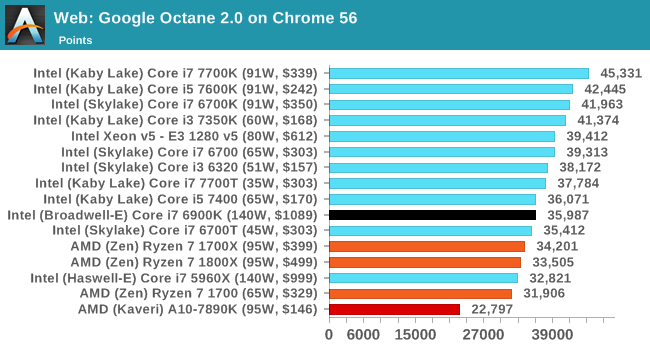
WebXPRT 2013 and 2015 [link]
While the previous three benchmarks do calculations in the background and represent a score, WebXPRT is designed to be a better interpretation of visual workloads that a professional user might have, such as browser based applications, graphing, image editing, sort/analysis, scientific analysis and financial tools. Web2013 is the older tool, superceded by Web2015, however both still are highly relevant for high-performance web applications today.
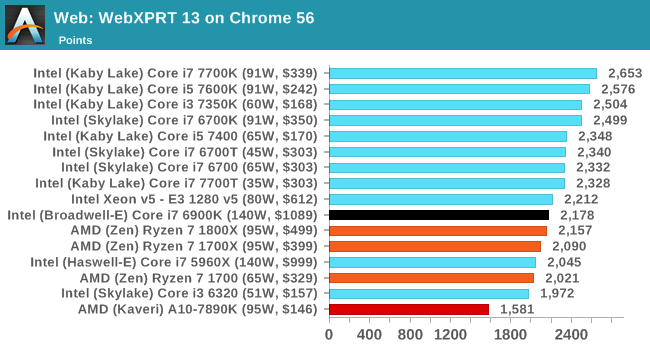
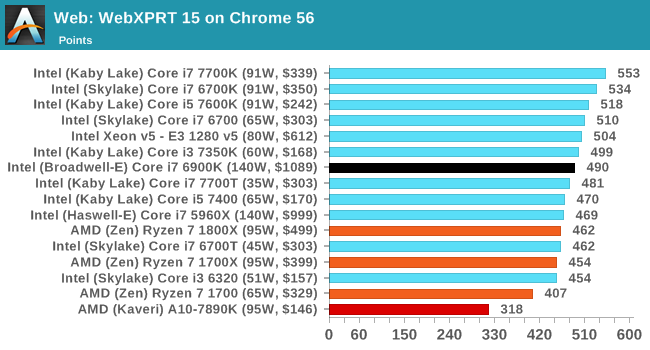


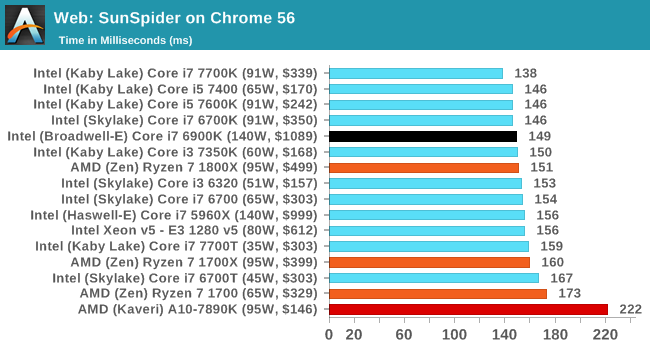
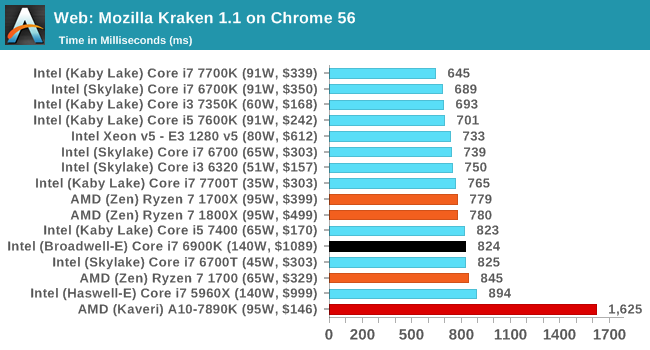








574 Comments
View All Comments
BurntMyBacon - Friday, March 3, 2017 - link
@ShieTar: "Well, the point of low-resolution testing is, that at normal resolutions you will always be GPU-restricted."If this statement is accepted as true, then by deduction, for people playing at normal (or high) resolutions, gaming is not a differentiator and therefore unimportant to the CPU selection process. If gaming is your only criteria for CPU selection, then that means you can get the cheapest CPU possible until you are not GPU restricted.
@ShieTar: "The most interesting question will be how Ryzen performs on those few modern games which manage to be CPU-restricted even in relevant resolutions, e.g. Battlefield 1 Multiplayer."
I agree here fully. Show CPU heavy titles to tease out the difference between CPUs. Artificially low resolutions are academic at best. That said, according to Steam Surveys, just over half of their respondents are playing at resolutions less than 1080P. Over a third are playing at 1366x768 or less. Though, I suspect the overlap between people playing at these resolutions and people using high end processors is pretty small.
Average frame rate is fairly uninteresting in most games for high end CPUs, due to being GPU bound or using unrealistic settings. Some, more interesting, metrics are min frame rate, frame time distribution (or simply graph it), frame time consistency, and similar. These metrics do more to show how different CPUs will change the experience for the player in a configuration the player is more likely to use.
Lord-Bryan - Thursday, March 2, 2017 - link
Who buys a 500 dollar cpu to play games at 720p res. All that talk is just BS.JMB1897 - Friday, March 3, 2017 - link
That test is not done for real world testing reasons. At that low resolution, you're not GPU bound, you're CPU bound. That's why the test exists.Now advance a few years into the future when you still have your $500 Ryzen 7 CPU and a brand new GPU - you may suddenly become CPU bound even at QHD or 4k, whereas a 7700k might not quite be CPU bound just yet.
MAC001010 - Saturday, March 4, 2017 - link
Or a few years in the future (when you get your new GPU) you find that games have become more demanding but better multi-threaded, in which case your Ryzen 7 CPU works fine and the 7700k has become a bottleneck despite its high single-threaded performance.This illustrates the inherent difficulty of comparing high freq. CPUs to high core count CPUs in regards to future potential performance.
cmdrdredd - Saturday, March 4, 2017 - link
"Or a few years in the future (when you get your new GPU) you find that games have become more demanding but better multi-threaded, in which case your Ryzen 7 CPU works fine and the 7700k has become a bottleneck despite its high single-threaded performance."Maybe, the overclocking scenario is also important. Most gamers will overclock to get a bit of a boost. I have yet to replace my 4.5Ghz 3570k even though new CPUs offer more raw performance, the need hasn't been there yet.
One other interesting thing is how Microsoft's PlayReady 3.0 will be supported for 4k HDR video content protection. So far I know Kaby Lake supports it, but haven't heard about any of AMD's offerings unless I missed it somewhere.
Cooe - Sunday, February 28, 2021 - link
Lol, except here in reality the EXACT OPPOSITE thing happened. A 6-core/12-thread Ryzen 5 1600 still holds up GREAT in modern titles/game engines thanks to the massive advantage in extra CPU threads. A 4c/4t i5-7600K otoh? Nowadays it performs absolutely freaking TERRIBLY!!!basha - Thursday, March 2, 2017 - link
all the reviews i read are using NVidia 1080 gfx card. my understanding is AMD graphics has better implementation of DX12 with ability to use multiple cores. I would like to see benchmarks with something like RX480 crosfire with 1700x. this would be in the similar budget as i7 7700 + GTX 1080.Notmyusualid - Friday, March 3, 2017 - link
http://www.gamersnexus.net/hwreviews/2822-amd-ryze...cmdrdredd - Saturday, March 4, 2017 - link
Overclocking will be interesting. I don't use my PC for much besides gaming and lately it hasn't been a lot of that either due to lack of compelling titles. However, I would still be interested in seeing what it can offer here too for whenever I finally break down and decide I need to replace my 3570k @ 4.5Ghz.Midwayman - Thursday, March 2, 2017 - link
Here's hoping the 1600x hits the same gaming benches as the 1800x when OC'd. $500 for the 1800x is fine, Its just not the best value for gaming. Just like the i5's having been better value gaming systems in the past.